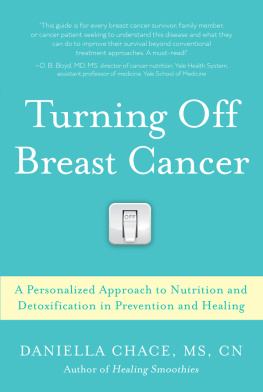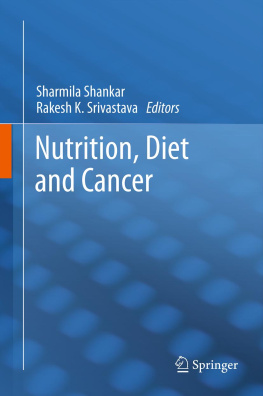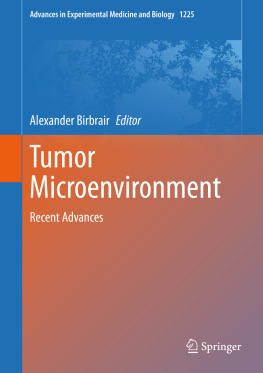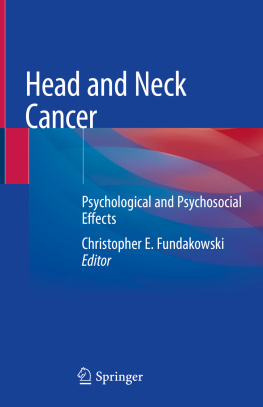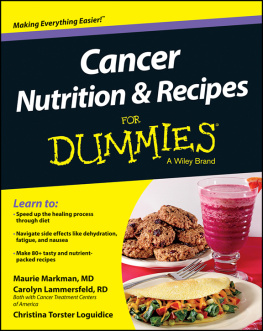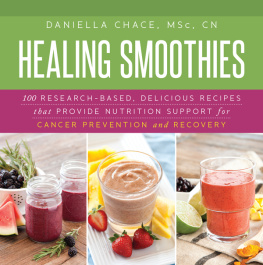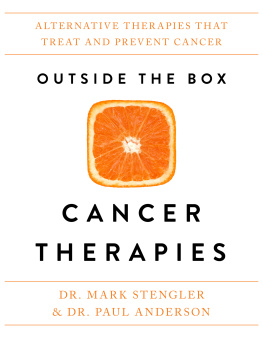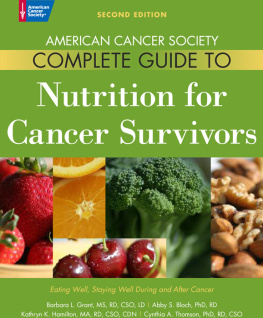Vincenzo Zappia , Salvatore Panico , Gian Luigi Russo , Alfredo Budillon and Fulvio Della Ragione (eds.) Cancer Treatment and Research Advances in Nutrition and Cancer 2014 10.1007/978-3-642-38007-5 Springer-Verlag Berlin Heidelberg 2014
The Role of Metabolic Carcinogenesis in Cancer Causation and Prevention: Evidence from the European Prospective Investigation into Cancer and Nutrition
Historical Background
The theory that nutrition might be involved in the causation or prevention of cancer developed at the beginning of the 1900s with the first laboratory studies on the effect of different diets on the development and growth of tumours. This early research found that tumours, either spontaneous or transplanted, would grow in well-nourished rodents while calorie-restricted diets inhibited tumour growth. The calorie restriction required to inhibit tumour growth was substantial compared to ad libitum. Further studies showed that calorie restriction also prevented recurrence of spontaneous tumours transplanted after excision [].
In the 1930s, Albert Tannenbaum and his collaborators, [].
The first known epidemiological study on diet and cancer in humans was published in 1933. This study of 462 cancer patients and 435 controls found that people who consumed more vegetables had a reduced risk of cancer, and those who drank more beer had a higher risk of developing cancers of the upper digestive tract [].
Tannenbaum led what was probably the first retrospective cohort study to investigate the effect of obesity on mortality from cancer and other diseases. The study used data from North American life insurance companies and found that there was a 3050 % increase in mortality from cancer among people who were obese at the time they had first subscribed to the health insurance policy [].
These results did not substantially modify mainstream approaches to cancer research; the prevailing hypothesis at the time was that cancer was caused by chemical or physical compounds that could be found in the living environment including the air, drinking water, food (as contaminants or chemical additives) or in occupational settings. Therefore, the majority of studies on cancer were essentially designed to identify new carcinogens and understand the mechanism of chemical and physical carcinogenesis.
The two major factors being investigated as potential lifestyle-related carcinogens at the time were tobacco and alcohol. The role of tobacco was clearly identified in the 1950s by the studies led in England by Richard Doll and Bradford Hill []. These studies demonstrated that the carcinogenic effect of being a lifelong smoker was exceptionally strong. For example, starting smoking at around age 1820 and smoking 2030 cigarettes per day multiplied the risk of developing lung cancer by 30- to 40-fold. The identification of a number of chemical compounds present in cigarette smoke and their testing in laboratory carcinogenesis models rapidly provided strong mechanistic support to the epidemiological studies.
The paradigm for the accrual of scientific evidence linking alcohol to cancer was much less straightforward for a number of reasons, one being the strength of the association between alcohol consumption and cancer risk. In fact, the relative increase in cancer risk due to alcohol consumption is substantial but not as strong as with cigarettes and lung cancer. Typically, elevated alcohol consumptionfor example in the order of 7080 g of alcohol per day (equivalent to one bottle of wine or four pints of beer)is associated with up to 5- or 6-fold increase in risk of developing cancers of the upper aerodigestive tract (mouth, pharynx, larynx and oesophagus) with a multiplicative effect for drinkers who also smoke. However, the relative risk increase for most other cancers (e.g. cancer of the colorectum, liver and breast) is much more modest, in the order of 1.5-fold.
Evidence from experimental animal models to demonstrate that alcohol can cause cancer also took much longer to accrue than for chemicals in cigarette smoke. The main mechanisms that have been identified to date for the influence of alcohol on cancer risk [] include DNA damage by acetaldehyde that may be particularly relevant for upper GI tract, liver; increased secretion and bioavailability of oestrogens, in relation to mammary tumours; production of reactive oxygen and nitrogen species and changes in folate metabolism.
As for diet, it was not until the 1960s and 1970s that the first casecontrol studies emerged that were designed with modern epidemiological methods to investigate the possible role of diet in the risk of developing cancer. The first studies investigated mainly cancers of the digestive tract (oesophagus, stomach, colon, rectum), respiratory tract (larynx, lung) and breast [].
Population-based cancer registry data indicated that the global incidence of many cancers varied enormously, with up to 1520-fold differences in the incidence of some cancers between different populations around the world (Fig. ).
Fig. 1
GLOBOCAN 2008 estimated cancer incidence rate worldwide per 100,000/yr for ( a ) colorectum and ( b ) breast cancer. Reproduced from []
For some cancers, such as lung or liver, the most likely explanation for these variations was found in the different history and prevalence of tobacco smoking or, as lately demonstrated, the incidence and prevalence of hepatitis B and C, exposure to aflatoxins from mould-contaminated food and alcoholic beverage consumption. For many other cancers, such as breast, colon and rectum, prostate and stomach, the explanations of the causes underlying these huge variations were unknown, but stimulated the hypothesis that diet could have a role in their aetiology.
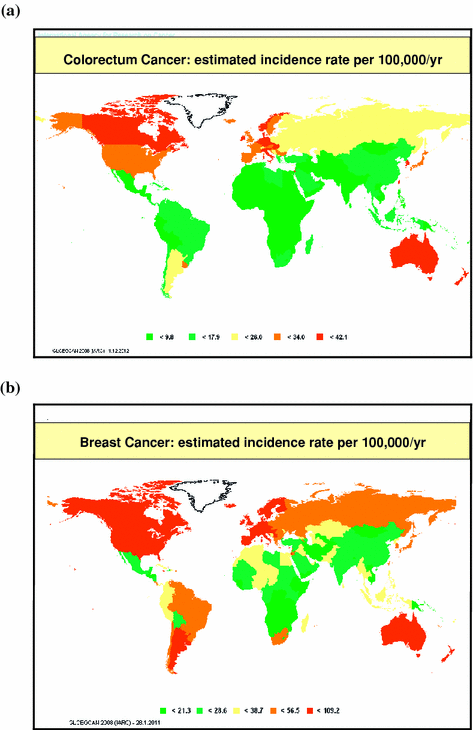

![Budillon Alfredo Advances in nutrition and cancer [indexed in PubMed/Medline]](/uploads/posts/book/169121/thumbs/budillon-alfredo-advances-in-nutrition-and-cancer.jpg)
